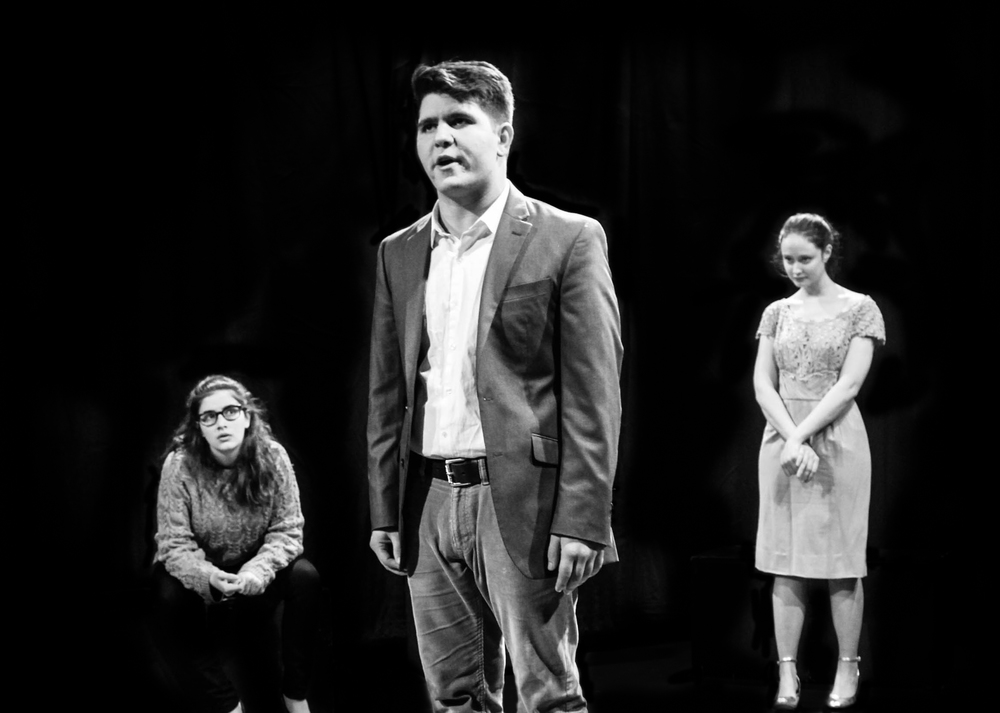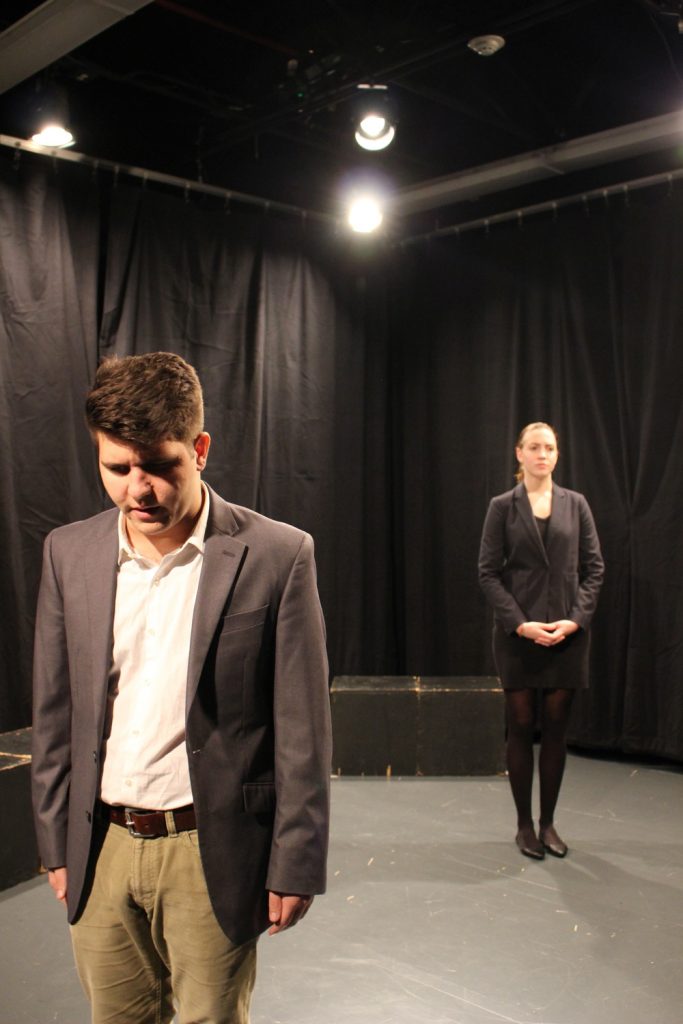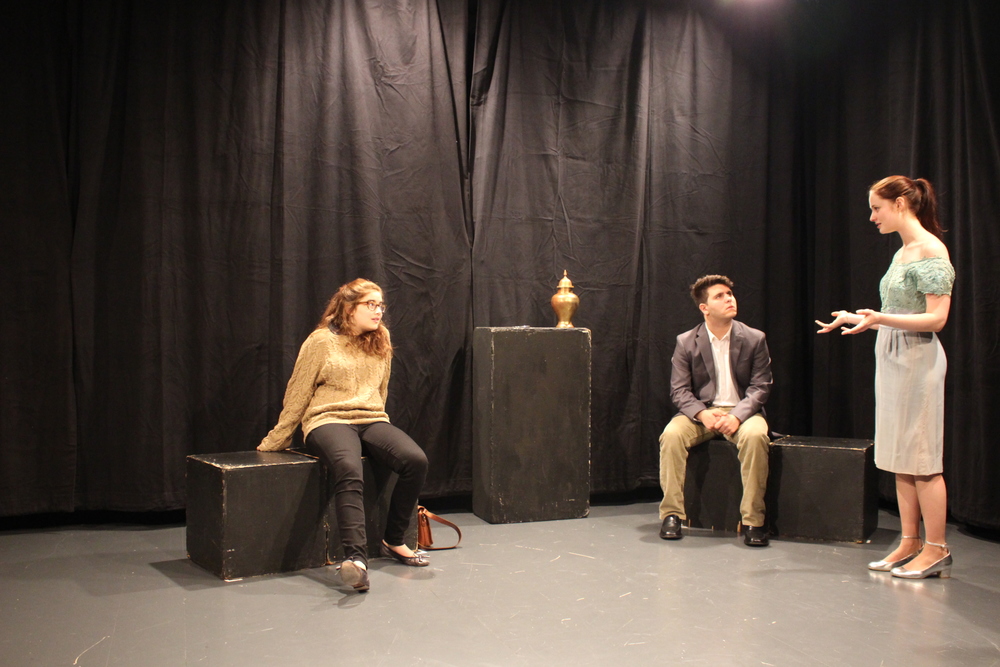
Miranda Falk ’19, Nicola Citera ’18, and Julia Friedland ’18. Photo Credit: Katie Nerod ’18.
Other People
By: ZACHARY COHN ’16
It begins in flickering light overhead, white and red. They suggest, somewhere beyond the black curtains of Studio A, the distant light of fire. Then, voices, as of three people speaking at the same time: a small chaos. Finally, a settling. A crisp young woman, black-suited, leads a bewildered man into a room no bigger than my own bedroom. This is, she informs him, to be his new residence for all eternity.
Welcome to Hell.

Nicola Citera ’18 and Rebecca Gracey ’18. Photo Credit: Katie Nerod ’18.
No Exit, Jean-Paul Sartre’s 1944 existentialist drama, takes place in a single room of the afterlife occupied by three clashing characters. These are Garcin (Nicola Citera ’18), a callous newspaperman; Estelle (Julia Friedland ’18), a vain society woman; and Inez (Miranda Falk ’19), an embittered postal clerk. Confined together by the otherworldly Valet (Rebecca Gracey ’18), they begin tearing down one another’s self-delusions, finding out in the process what landed each of them in Hell.
The play, confined to a single space and built on pages of philosophical dialog and internal anguish, presented a number of challenges to both actors and director Hannah Baker ’16. First was the nature of the playing space; Baker chose to limit it to a small corner of the studio in order to play with “the tension that’s built in [a] very small space, and when that tension explodes.” She also faced the “static” nature of the play itself, closed as it is in one sealed room. Baker’s strategy was to focus on “spatial relations,” which she hoped would invoke an emotional experience in both actor and audience. These spatial relations were vital to the play in performance—two characters close together on a couch meant conspiracy or seduction, a turn toward the door indicated the character receiving a vision of the living world—and each movement drew me deeper into the physical world of the play.

Miranda Falk ’19, Nicola Citera ’18, and Julia Friedland ’18. Photo Credit: Katie Nerod ’18
The actors dealt with a different, equally bedeviling challenge. While the characters’ internal lives teem with hidden secrets and white-hot emotion, their dialogue more often reflects false cordiality, frustration, or misunderstanding of themselves. “We’re finding those moments where we are kind of shut down and not confronting [our] baggage, and then…all of a sudden it does come out, and then the room feels smaller, and we all have to deal with it. So I think a lot of this show is about that push and pull,” said Friedland. Each actor managed that push and pull deftly: Citera’s Garcin smoldered under pressure, while Friedland’s Estelle kept up a frosty façade. Falk’s Inez, meanwhile, buzzed between them, a nervous, restless presence. As someone mostly outside the room, Gracey’s Valet floated in another world—“I just let them in and laugh at them,” said Gracey.
Paired with Baker’s minimalist approach to setting (a bronze urn, a paper knife, black blocks), these dynamics and energies shone against each other. The process had put the actors into a deceptively collaborative and harmonious relationship, each pulling his or her weight to lift the text of No Exit into a theatrical reality. Sartre writes in this play that “hell is other people,” but he was not quite right in this case—cooperation can make even going through Hell anything but hellish to watch.
Zach Cohn is a senior Theater major and a staff writer for the Living Newsletter.
No Exit Credits:
Writer: Jean-Paul Sartre
Director: Hannah Baker ’16
Cast: Julia Friedland ’18 (Estelle), Miranda Falk ’19 (Inez), Nicola Citera ’18 (Garcin), and Rebecca Gracey ’18 (Valet)
Crew: Omi Furst ’18 (Stage Manager), Madeleine Emerick ’16 (Fight Choreographer)










